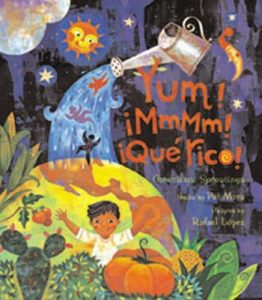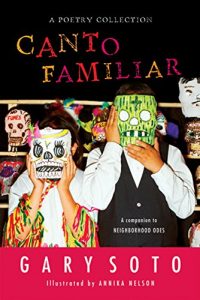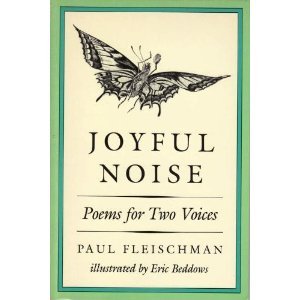 A collection of poems describing the characteristics and activities of a variety of insects.
A collection of poems describing the characteristics and activities of a variety of insects.
Poetry
Poetry genre
Shadow
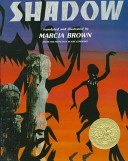
Shadow lives in the forest… It goes forth at night to prowl around the fires. It even likes to mingle with the dancers… Shadow… It waves with the grasses, curls up at the foot of trees… But in the African experience Shadow is much more. The village storytellers and shamans of an Africa that is passing into memory called forth for the poet Blaise Cendrars an eerie image, shifting between the beliefs of the present and the spirits of the past. Shadow… It does not cry out, it has no voice… It can cast a spell over you… It follows man everywhere, even to war… Marcia Brown’s stunning illustrations in collage, inspired by her travels in Africa, evoke the atmosphere and drama of a life now haunted, now enchanted by Shadow.
Out of the Dust
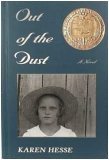
In a series of poems, fifteen-year-old Billie Jo relates the hardships of living on her family’s wheat farm in Oklahoma during the dust bowl years of the Depression.
Owl Moon: 20th Anniversary Edition
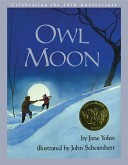
On a winter’s night under a full moon, a father and daughter trek into the woods to see the Great Horned Owl.
Seeds of Struggle, Songs of Hope
This is a collection of poetry written by Chicano/Latino youths about their dreams, struggles, identity, hope and love.
Worlds Apart: Fernie And Me
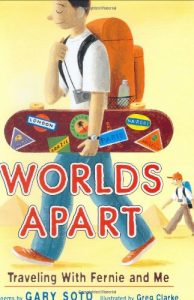 We met these spirited best friends in Fearless Fernie, and now they’re taking on the world! From boxing a kangaroo in Australia to craving Mexican food in Taiwan, or riding a runaway camel in Egypt and eating cheese as holey and smelly as their socks in Switzerland, the globe is their imaginary playground.
We met these spirited best friends in Fearless Fernie, and now they’re taking on the world! From boxing a kangaroo in Australia to craving Mexican food in Taiwan, or riding a runaway camel in Egypt and eating cheese as holey and smelly as their socks in Switzerland, the globe is their imaginary playground.
Gary Soto’s accessible and humorous poems will elicit nods of recognition and bursts of laughter as readers enjoy this outrageous jaunt around the world.
Fearless Fernie: Hanging Out With Fernie and Me
 For Fernie and his best friend, the fun begins when they are babies who crawl across the lawn towards each other, away from their parents’ watchful eyes. And once they find each other, they are inseparable. Together, they grow to be the self-proclaimed artistic geniuses and master athletes of their school. But they do admit to being losers at spelling bees and camping out. And when it comes to romance, well, if waltzing with a broom in the kitchen or sporting glowing orange socks to a school dance counts, these guys are cool. Gary Soto’s original poems and Regan Dunnick’s clever illustrations will spark recognition in all middle-schoolers who’ve gone through the humiliation of sports try-outs and first dances; who’ve had to deal with body images and swinging moods. Each of the poems in this book shows a scene from their sometimes difficult, sometimes comical lives growing up together as best friends. Even though they don’t have everything in common, they both know that at least they’re in it together.
For Fernie and his best friend, the fun begins when they are babies who crawl across the lawn towards each other, away from their parents’ watchful eyes. And once they find each other, they are inseparable. Together, they grow to be the self-proclaimed artistic geniuses and master athletes of their school. But they do admit to being losers at spelling bees and camping out. And when it comes to romance, well, if waltzing with a broom in the kitchen or sporting glowing orange socks to a school dance counts, these guys are cool. Gary Soto’s original poems and Regan Dunnick’s clever illustrations will spark recognition in all middle-schoolers who’ve gone through the humiliation of sports try-outs and first dances; who’ve had to deal with body images and swinging moods. Each of the poems in this book shows a scene from their sometimes difficult, sometimes comical lives growing up together as best friends. Even though they don’t have everything in common, they both know that at least they’re in it together.
Red Hot Salsa: Bilingual Poems On Being Young and Latino in the United States
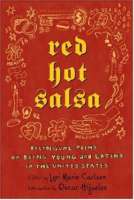
A collection of English and Spanish bilingual poems from the editor of Cool Salsa.

